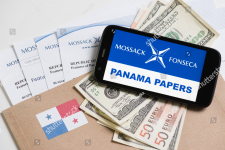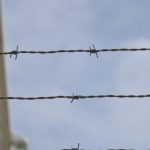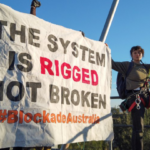The Panama Papers: A Lesson in Tax Avoidance

An Oxfam report released on 20 January revealed that last year 26 billionaires owned the same amount of wealth as the poorest 3.8 billion people around the globe. This was down from 43 individuals the year before. And this extreme wealth disparity is accelerating every year.
As has been exposed over recent times, some amongst the richest portion of society have a habit of avoiding paying taxes. There was the Panama Papers leaked in 2015. And then there was the largest ever leak of financial information – the Paradise Papers – that came to light in late 2017.
The Paradise Papers consist of 13.4 million pages that reveal the global rich avoiding tax payments by using offshore tax havens and secrecy jurisdictions. German newspaper Süddeutsche Zeitung obtained and shared them with the International Consortium of Investigative Journalists (ICIJ).
And according to the ICIJ’s Gerard Ryle, what was important about this leak is “it’s the high end of town”, whereas its Panama counterpart dealt with “rogue players”. So, with the Panama Papers you’re talking Facebook, Amazon, Queen Elizabeth II and Donald Trump’s son-in-law.
Despite the magnitude of what’s exposed, for the most part, people looked the other way. However, if you dig deep into the documents, as St Louis tax accountant Ken Boyd recently did, what you find is the perfect how-to guide on tax avoidance.
A tax accountant’s take
“Most striking to me was the sheer scale of the leak,” Mr Boyd told Sydney Criminal Lawyers. “And the speed with which these documents were perused and reported upon once released.” And he also pointed to the exposed “connection between Trump’s administration and wealthy Russians”.
In his report Tax Avoidance By The Numbers: The Paradise Papers, the accountant explains that the majority of the documents – 7 million – were from Appleby: one of the world’s largest offshore law firms, with its headquarters in Bermuda. It’s been in business for over 125 years.
Half a million documents came from AsiaCiti: a wealth protection company in Singapore. And the rest were from corporate registries in secrecy jurisdictions, which are countries that allow entities to avoid tax regulations in a way that’s not made public. These include the Cook Islands and Samoa.
Tax avoidance by numbers
“The techniques exposed by the Paradise Papers operate in a somewhat grey area that’s arguably within the letter of the law,” Mr Boyd explained. “Often, the tax avoidance employed will involve convoluted business structures, with extensive use of offshore tax havens.”
The most common way to do this is by setting up a shell company, which are businesses that hold funds and manage the financial transactions of other entities. There aren’t any employees. And they don’t trade on exchanges. Shell companies are perfect places to hide wealth.
The advantage of setting up such a company in a tax haven is these jurisdictions’ tax rates are extremely low or non-existent. And as these areas don’t report tax information, individuals and companies can place money in offshore accounts without their own government’s realising.
Indeed, one of the most popular places to carry out this practice is a five storey office block called Ugland House in the Cayman Islands. Around 20,000 companies are registered to this premises, whilst another 80,000 companies are registered throughout this British Overseas Territory.
Although, according to Boyd, these practices are becoming less acceptable, as the public reaction to the recent leaks has shown. “Even when high-profile individuals and companies are complying with the letter of the law,” he went on, “they’re seen to be flouting the spirit of it.”
Some of the main offenders
As set out in the report, the Duchy of Lancaster, the private estate of Queen Elizabeth II, invested in UK household goods company BrightHouse. But, instead of directly investing, the Duchy avoided paying taxes by directing the money through a private equity company in the Cayman Islands.
Colombian pop singer Shakira funnelled $31 million worth of intellectual property rights into a company she owned called Tournesol in Malta, which is a well-known secrecy jurisdiction. Following the leak, the Spanish government investigated her for tax evasion.
And former Turkish prime minister Binali Yildirim and his sons were found to be stashing cash in a Maltese shell company. However, exposing this caused dire problems for one Turkish journalist. Pelin Ünker was sentenced to 13 months gaol time last month for writing about the dodgy dealings.
But why should we care?
While these offshore investments aren’t illegal, they do harm the communities where the wealth is being siphoned from. Tax revenue is used to fund infrastructure, healthcare and public education. But, with a lack of it, these institutions suffer, and so too does the public that relies on them.
And in the meantime, the uber-rich are avoiding paying the taxes required by the law of the jurisdictions in which they live, whilst at the same time they reap the benefits of the tax-funded services their society offers them.
As Mr Boyd points out 366 of the Fortune 500 companies hold US$2.6 trillion in offshore tax havens, which would amount to US$752 billion in back taxes. While, Berkeley professor Gabriel Zucman estimates that 8 percent of global wealth – or US$7.6 trillion – is held offshore.
The accountant further outlined that “the world’s most valuable public company” Apple stashes most of its non-US earnings in offshore havens, whilst Nike has US$6.6 billion in cash being taxed at just 3 percent in Bermuda.
The avoidance continues
“At the time the story broke in November 2017, it made some waves,” Boyd recalls. And there was talk of creating legislation to tighten it up. But, he admits that considering the size of the scandal, the media paid little attention.
Mr Boyd puts this down to two things. Firstly, “tax affairs – particularly those involving complex offshore arrangements – can seem rather impenetrable to the general public”. And second, the financial practices that were leaked were more of an ethical problem, than a legal one.
And as for Appleby, it’s business as usual. After it tried to sue the Guardian and the BBC for exposing the documents, the offshore legal firm came to an agreement with the media companies, after it was found that the majority of the leaked documents were no longer owned by Appleby.
“The practices exposed were arguably legal,” Mr Boyd concluded. “Had the Paradise Papers exposed instances of outright tax evasion, that would have been far bigger news.”







